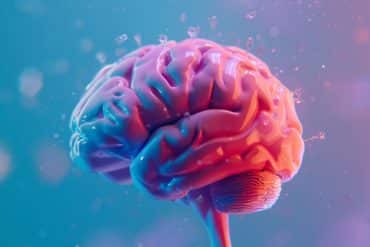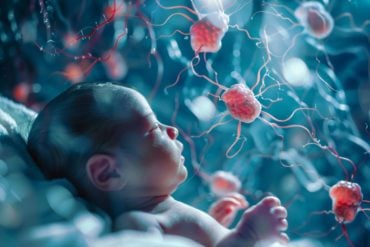Scientists produce strongest evidence yet of schizophrenia’s causes. Researchers discover that risk mutations disrupt a delicate chemical balance in the brain, responsible for brain development and function.
An international team of scientists led by Cardiff University researchers has provided the strongest evidence yet of what causes schizophrenia – a condition that affects around 1% of the global population.
Published today in the journal Neuron, their work presents strong evidence that disruption of a delicate chemical balance in the brain is heavily implicated in the disorder.
In the largest ever study of its kind, the team found that disease-linked mutations disrupt specific sets of genes contributing to excitatory and inhibitory signalling, the balance of which plays a crucial role in healthy brain development and function.
The breakthrough builds on two landmark studies led by members of the Cardiff University team, published last year in the journal Nature.
“We’re finally starting to understand what goes wrong in schizophrenia,” says lead author Dr Andrew Pocklington from Cardiff University’s MRC Centre for Neuropsychiatric Genetics and Genomics.
“Our study marks a significant step towards understanding the biology underpinning schizophrenia, which is an incredibly complex condition and has up until very recently kept scientists largely mystified as to its origins.
“We now have what we hope is a pretty sizeable piece of the jigsaw puzzle that will help us develop a coherent model of the disease, while helping us to rule out some of the alternatives.
“A reliable model of disease is urgently needed to direct future efforts in developing new treatments, which haven’t really improved a great deal since the 1970s.”
Professor Hugh Perry, who chairs the Medical Research Council Neuroscience and Mental Health Board said: “This work builds on our understanding of the genetic causes of schizophrenia – unravelling how a combination of genetic faults can disrupt the chemical balance of the brain.
“Scientists in the UK, as part of an international consortium, are uncovering the genetic causes of a range of mental health issues, such as schizophrenia.
“In the future, this work could lead to new ways of predicting an individual’s risk of developing schizophrenia and form the basis of new targeted treatments that are based on an individual’s genetic makeup.”
A healthy brain is able to function properly thanks to a precise balance between chemical signals that excite and inhibit nerve cell activity. Researchers studying psychiatric disorders have previously suspected that disruption of this balance contributes to schizophrenia.
The first evidence that schizophrenia mutations interfere with excitatory signalling was uncovered in 2011 by the same team, based at Cardiff University’s MRC Centre for Neuropsychiatric Genetics and Genomics.
This paper not only confirms their previous findings, but also provides the first strong genetic evidence that disruption of inhibitory signalling contributes to the disorder.
To reach their conclusions scientists compared the genetic data of 11,355 patients with schizophrenia against a control group of 16,416 people without the condition.

They looked for types of mutation known as copy number variants (CNVs), mutations in which large stretches of DNA are either deleted or duplicated.
Comparing the CNVs found in people with schizophrenia to those found in unaffected people, the team was able to show that the mutations in individuals with the disorder tended to disrupt genes involved in specific aspects of brain function.
The disease-causing effects of CNVs are also suspected to be involved in other neurodevelopmental disorders such as intellectual disability, Autism Spectrum Disorder and ADHD.
Around 635,000 people in the UK will at some stage in their lives be affected by schizophrenia.
The estimated cost of schizophrenia and psychosis to society is around £11.8 billion a year.
The symptoms of schizophrenia can be extremely disruptive, and have a large impact on a person’s ability to carry out everyday tasks, such as going to work, maintaining relationships and caring for themselves or others.
Funding: The research in Cardiff was funded by the Medical Research Council (MRC) and the European Community’s Seventh Framework Programme. Work carried out by other members of the team based at The Broad Institute of MIT and Harvard was funded by a philanthropic gift to the Stanley Center for Psychiatric Research.
Source: Tomas Llewelyn Barrett – Cardiff University
Image Source: Image is credited to Marco Castellani and is licensed Creative Commons Attribution-Share Alike 2.0 Generic
Original Research: Full open access research for “Novel Findings from CNVs Implicate Inhibitory and Excitatory Signaling Complexes in Schizophrenia” by Andrew J. Pocklington, Elliott Rees, James T.R. Walters, Jun Han, David H. Kavanagh, Kimberly D. Chambert, Peter Holmans, Jennifer L. Moran, Steven A. McCarroll, George Kirov, Michael C. O’Donovan, and Michael J. Owen in Neuron. Published online June 3 2015 doi:10.1016/j.neuron.2015.04.022
Abstract
Novel Findings from CNVs Implicate Inhibitory and Excitatory Signaling Complexes in Schizophrenia
Highlights
•First genetic evidence for disruption of GABAergic signaling in schizophrenia
•No evidence for CNV disruption of biological processes beyond the CNS
•Support for involvement of NMDAR and ARC complexes in schizophrenia
•Additional, independent evidence for disruption of glutamatergic signaling
Summary
We sought to obtain novel insights into schizophrenia pathogenesis by exploiting the association between the disorder and chromosomal copy number (CNV) burden. We combined data from 5,745 cases and 10,675 controls with other published datasets containing genome-wide CNV data. In this much-enlarged sample of 11,355 cases and 16,416 controls, we show for the first time that case CNVs are enriched for genes involved in GABAergic neurotransmission. Consistent with non-genetic reports of GABAergic deficits in schizophrenia, our findings now show disrupted GABAergic signaling is of direct causal relevance, rather than a secondary effect or due to confounding. Additionally, we independently replicate and greatly extend previous findings of CNV enrichment among genes involved in glutamatergic signaling. Given the strong functional links between the major inhibitory GABAergic and excitatory glutamatergic systems, our findings converge on a broad, coherent set of pathogenic processes, providing firm foundations for studies aimed at dissecting disease mechanisms.
“Novel Findings from CNVs Implicate Inhibitory and Excitatory Signaling Complexes in Schizophrenia” by Andrew J. Pocklington, Elliott Rees, James T.R. Walters, Jun Han, David H. Kavanagh, Kimberly D. Chambert, Peter Holmans, Jennifer L. Moran, Steven A. McCarroll, George Kirov, Michael C. O’Donovan, and Michael J. Owen in Neuron. Published online June 3 2015 doi:10.1016/j.neuron.2015.04.022






